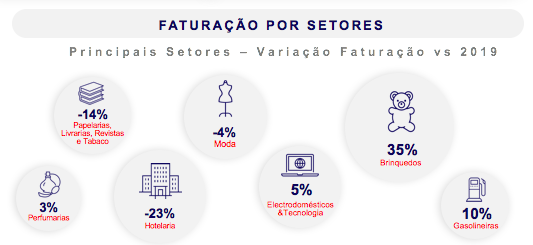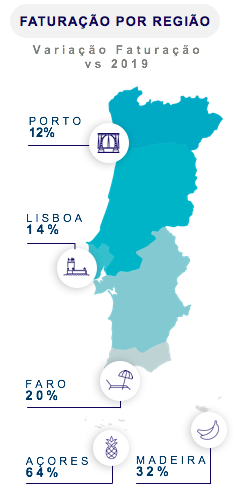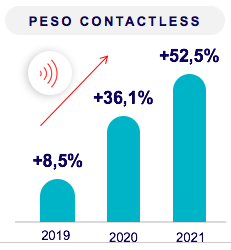
After a 2020 marked by successive lockdowns that negatively impacted the life of Portuguese businesses, last Christmas and New Year's Eve brought good news, as between 1 December and 2 January, retailers' turnover not only increased by 25% compared to the same period in 2020, but even managed to exceed pre-pandemic (2019) levels by 17%.
This is one of the two main conclusions of the latest transactional analysis report REDUNIQ InsightsThe other is the more than expected 23% drop in turnover compared to 2019 in Hotels and Hotel Activities due to the containment measures of the Ómicron variant.
Sales peaked on 22 and 23 December
According to the data presented in the report, the 22nd and 23rd of December proved to be extremely important in overcoming the pre-pandemic figures, as this was the period when the highest turnover figures were recorded, with a special focus on the 23rd, which saw an increase of 68% compared to the average for the rest of the festive season.

Comparing the turnover figures for these two days with those for the same periods in 2020 and 2019, it can be seen that the 22nd saw increases of 17.5% and 24% respectively. On the 23rd, there was an increase of 20% compared to 2019, and 20.7% compared to 2020.
Moving forward a few days on the calendar and stopping on the 30th, we can see that this trend compared to the last two years continues. Thus, on the following week, the 30th recorded 16% more turnover than in 2019 and 6% more than in 2020, while the last day of the year exceeded the turnover figures recorded in 2019 by 10% and 16% more than in 2020.
Despite the increase in turnover this festive season, the average ticket (average value of each purchase) in the period under review ended up being lower than in the previous two years, standing at 34.8€. It should be noted that in 2019, the value of each purchase was around €37.4 on average, while in 2020 it was €36.9.
Restraint measures for new bypass justify drop in tourism
As we've mentioned, the positive scenario experienced in turnover over Christmas and New Year's Eve was counterbalanced by a drop in the Hotel and Tourist Activities sector, the result, above all, of the containment measures of the Ómicron variant.
These restrictions ended up putting tourists off, especially foreign tourists, as can be seen by analysing the foreign turnover figures: down 6% compared to the same period in 2019.

In global terms, according to the report REDUNIQ InsightsBetween 1 December and 2 January, the tourism sector recorded a drop in turnover of around 23% compared to 2019, the last end of the year during the pre-pandemic.
This sector, however, was not the only one to fall during the festive season, as turnover in Stationery/Bookshops and Fashion also fell by 14% and 4% respectively compared to 2019.
In the opposite direction, we find Toy Stores, Petrol Stores and Electrical Appliances and Technology, sectors that during the period under review recorded a positive performance compared to the same period in 2019, showing growth of 35%, 10% and 5%, respectively.
Azores lead growth in turnover
When we analyse the available data from a geographical point of view, we see that all the country's districts recorded positive performances compared to the same period in 2019.

At the top of this list are the Azores, which saw a 64% increase in turnover between 1 December and 2 January, followed by Madeira (+32%), Faro (+20%), Lisbon (+14%) and Porto (+12%).
Contactless accounted for more than 50% of Portuguese business turnover
Continuing their unstoppable march are the contactless payments which, between 1 December and 2 January, accounted for 52% of the total transactions made on the REDUNIQ payment network, a figure that contrasts with the 36.1% and 8.5% recorded in the same period of 2020 and 2019, respectively.

Despite the growing weight of contactless technology in the turnover of Portuguese businesses is not new, these 52% prove the gradual consolidation of contactless payments, and even a growing adherence by the Portuguese to new ways of paying based on the use of smartphones or wearables.
Realising the need for businesses to adjust to consumer needs and preferences, REDUNIQ, through the technological development of payment terminals (TPA) is helping to transform the landscape of the payments industry in Portugal.
A fine example of this is REDUNIQ Smart Android payment terminal which, in addition to accepting contactless payments with card, chip, MB Way, Apple Pay and Google Pay, brings a set of built-in management apps that support businesses and allow them to be totally mobile and digital.
By functioning as Contactless TPA and management centre connected to the digital world, this new solution REDUNIQ Android TPA offers businesses extra flexibility in managing their resources, since, for example, with the ZS Mobile app a shopkeeper can register orders on the terminal, invoice (AT certification) or draw up quotes and orders even without an Internet connection, while with the WinRest or ZSRest, a catering business will now be able to display menus, register and confirm customer orders and even integrate its invoicing software into a single Physical TPA.


